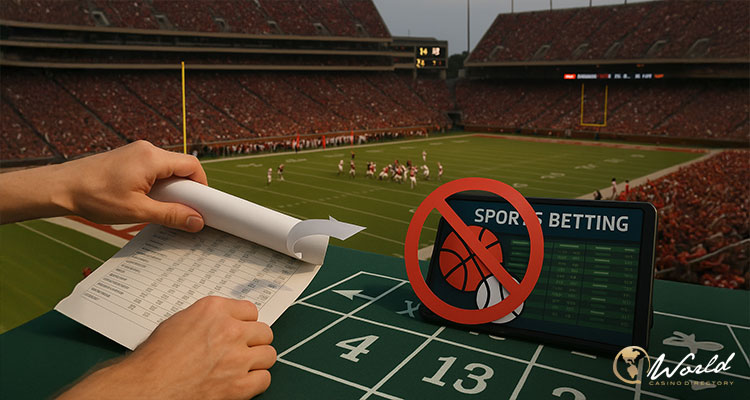Despite earlier approval for limited wagering freedom, NCAA institutions have opted to reverse course and maintain a uniform prohibition on sports betting for all college athletes and athletics department staff. After the required 30-day review period, Division I schools cast the decisive votes needed to halt a rule change that would have permitted betting on professional sports only. With more than two-thirds voting in favor of rescission, the NCAA confirmed that the preexisting restrictions remain intact. As the organization stated, “Because sports betting rules are common legislation, the ban on all forms of betting — for sports in which the NCAA sponsors a championship — will remain in place for all three NCAA divisions.”
Division I Reversal Ends Proposed November Policy Shift
The abandoned proposal would have represented a rare relaxation of NCAA betting standards, allowing student-athletes and athletic department employees to place wagers solely on professional events. That change had been scheduled to take effect on November 1, but because the Division I cabinet initially adopted the policy with less than 75% support, all member schools were granted a 30-day window to vote for or against nullifying it. As stated in NCAA’s press release, by Friday, the threshold needed to revoke the change was surpassed, stopping the update one day before the procedural deadline.
The NCAA reiterated the message in a statement shared publicly, noting again that “the ban on all forms of betting – for sports in which the NCAA sponsors a championship – will remain in place for all three NCAA divisions.” This outcome means Divisions II and III, which were also preparing to implement the same adjustment for professional-sports wagering, will likewise continue enforcing the existing rules.
The timing of the vote coincided with a series of sports betting controversies that have placed heightened scrutiny on both college and professional leagues. As outlined in the coverage, federal authorities in late October arrested Chauncey Billups, head coach of the Portland Trail Blazers, and Miami Heat guard Terry Rozier in a sweep involving alleged betting networks. Rozier was accused of using confidential player information to gain an advantage when wagering on NBA games.
Alongside these cases, the NCAA recently imposed sanctions on six men’s basketball players over betting violations. On Friday, the organization also disclosed that former Temple guard Hysier Miller had placed multiple wagers involving Owls matchups, including bets made against his own team.
These events reinforced concerns about game integrity throughout collegiate athletics. Additional unease came from within the NCAA membership itself, particularly from the Southeastern Conference. SEC commissioner Greg Sankey directly urged the organization to abandon the policy change, writing, “On behalf of our universities, I write to urge action by the NCAA Division I Board of Directors to rescind this change and reaffirm the Association’s commitment to maintaining strong national standards that keep collegiate participants separated from sports wagering activity at every level.” Sankey added that if the prior framework required attention, adjustments should occur “through careful refinement – not through wholesale removal of the guardrails that have long supported the integrity of games and the well-being of those who participate.”
Full Ban Continues Amid Growing Enforcement Workload
Even if the modification had moved forward, NCAA athletes and staff would still have been barred from betting on collegiate events. With Friday’s vote, all forms of sports betting continue to be off-limits across Divisions I, II, and III. This decision comes as NCAA enforcement teams face a rising number of wagering-related cases, with at least a dozen additional investigations underway according to recent reporting.
The organization emphasized that the rule change’s revocation applies uniformly across all levels of competition, preserving the system designed to keep college sports insulated from betting influences despite broader legalization trends nationwide.



